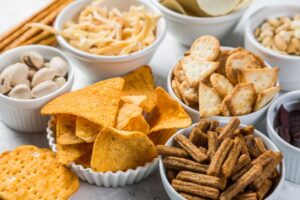
One of the best things about dental implants is that they can restore your ability to eat virtually any food, including fresh fruits and veggies, savory meats, corn on the cob, and more. Before you reach that point, though, you will have to undergo dental implant surgery. As you are recovering, it is important that you adhere to some dietary guidelines. Doing so will reduce your risk of complications and minimize your discomfort. What foods should you avoid during that time period? Here are some examples:
Hot and Spicy Foods
Spicy and hot foods can irritate your incision sites, potentially slow recovery, and may increase the risk of infection. It is advisable to consume warm or room-temperature foods and avoid dishes with heavy seasoning.
Alcohol
Under normal circumstances, it is perfectly fine to indulge in the occasional beer, glass of wine, or cocktail. However, alcohol should be completely avoided in the days after your dental implant surgery. It can slow down your body’s ability to heal and increase swelling. It could even interact with pain medications and cause dangerous complications.
Sticky or Chewy Foods
You can expect your mouth and jaw to be sore after your surgery. Eating foods that take a lot of energy to chew, such as sticky and chewy items, is only likely to worsen your discomfort. You may also find it extremely difficult to consume them, especially if you have few to no natural teeth left in your mouth. Therefore, it is best to avoid things like chewy candies, tough meats, and hard breads.
Crunchy Foods
Crunchy foods tend to break down into hard pieces with jagged edges. Those little bits of food may cause great irritation at your surgical sites, which could heighten your risk of infection. Some crunchy foods that you should avoid include crackers, chips, popcorn, and nuts.
How Long Will the Food Restrictions Last?
People tend to heal at different rates; your dentist may give you specific instructions on how to manage your diet while you are recovering from dental implant surgery. Generally speaking, though, most patients are advised to:
- Eat a “no-chew” diet for about one week. This should include things like smoothies, brothy soups, mashed potatoes, and yogurt.
- Eat a fork-tender diet until your new teeth are in place. This can include anything that is easy to cut with the side of a fork. Broiled fish, soft breads, meatloaf, and scrambled eggs all fall into this category.
- Avoid alcohol for as long as necessary. At the very least, you should abstain until your incisions are fairly well-healed and you are no longer taking pain medication.
Once you receive your permanent new crown, bridge, or denture to go on top of your dental implants, you can gradually work your way back to your preferred diet.
You might need to temporarily stay away from some of your favorite treats after dental implant surgery. However, any sacrifices you make will be worth it when you have a strong and healthy set of teeth that can handle virtually any food!
About the Practice
At Meriden Dental Group, our team is proud to offer comprehensive dental implant services in a welcoming, modern environment. If you have questions about the placement surgery or what you should do during the recovery period, we would be pleased to speak with you. Contact our office at 203-404-6800.
